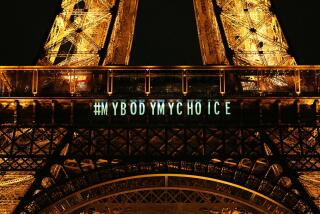The Right to Deny Genocide
WHAT A magnificent blow for truth, justice and humanity the French National Assembly has struck. Last week, it voted for a bill that would make it a crime to deny that the Turks committed genocide against the Armenians during World War I. Bravo! Chapeau bas! Vive la France! But let this only be a beginning in a brave new chapter of European history.
Let Britain’s Parliament now make it a crime to deny that it was Russians who murdered Polish officers at Katyn in 1940. Let the Turkish parliament make it a crime to deny that France used torture against insurgents in Algeria. Let the German parliament pass a bill making it a crime to deny the existence of the Soviet gulag. Let the Irish parliament criminalize denial of the horrors of the Spanish Inquisition. Let the Spanish parliament mandate a minimum of 10 years imprisonment for anyone who claims that the Serbs did not attempt genocide against Albanians in Kosovo.
And the European Parliament should pass into European law a bill making it obligatory to describe as genocide the American colonists’ treatment of American Indians. The only pity is that we, in the European Union, can’t impose the death sentence for these heinous thought crimes. But perhaps, with time, we may change that too.
Oh brave new Europe! It is entirely beyond me how anyone in their right mind — apart, of course, from a French Armenian lobbyist — can regard this proposed bill, which will almost certainly be voted down in the upper house of the French parliament, as a progressive and enlightened step.
What right has France to prescribe by law the correct historical terminology to characterize what another nation did to a third nation 90 years ago? If the French parliament passed a law making it a crime to deny the complicity of Vichy France in the deportation to the death camps of French Jews, I would still argue that this was a mistake, but I could respect the self-critical moral impulse behind it. This bill, by contrast, has no more moral or historical justification than any of the other suggestions I have just made.
In an article last Friday, the Guardian averred that “supporters of the law are doubtless motivated by a sincere desire to redress a 90-year-old injustice.” I wish I could be so confident. Currying favor with French Armenian voters and putting another obstacle in the way of Turkey joining the EU might be suggested as other motives.
It will be obvious to every intelligent reader that my argument has nothing to do with questioning the suffering of the Armenians who were massacred, expelled or felt impelled to flee in fear of their lives during and after World War I. Their fate at the hands of the Turks was terrible and has been too little recalled in the mainstream of European memory. Reputable historians and writers have made a strong case that those events deserve the label of genocide, as it has been defined since 1945. In fact, this year’s winner of the Nobel Prize in Literature, Orhan Pamuk, and other Turkish writers have been prosecuted under the Turkish penal code for daring to suggest exactly that. That is significantly worse than the intended effects of the new French bill. But two wrongs don’t make a right.
No one can legislate historical truth. Insofar as historical truth can be established at all, it must be found by unfettered historical research, with historians arguing over the evidence and the facts, testing and disputing each other’s claims without fear of prosecution or persecution.
In the tense ideological politics of our time, this proposed bill is a step in exactly the wrong direction. How can we credibly criticize Turkey, Egypt or other states for curbing free speech, through the legislated protection of historical, national or religious shibboleths, if we are doing ever more of it ourselves?
Far from creating new, legally enforced taboos about history, national identity and religion, those European nations that have them should repeal not only their blasphemy laws but also their laws on Holocaust denial. Otherwise, a charge of double standards is impossible to refute.
I recently heard the French philosopher Bernard-Henri Levy going through some impressive intellectual contortions to explain why he opposed any laws restricting criticism of religion but supported those on Holocaust denial. It was one thing, he argued, to question a religious belief, quite another to deny a historical fact. But this won’t wash. Historical facts are established precisely by their being disputed and tested against the evidence. Without that process of contention — up to and including the revisionist extreme of outright denial — we would never discover which facts are truly hard.
Such consistency requires painful decisions. For example, I have nothing but abhorrence for some of David Irving’s recorded views about Nazi Germany’s attempted extermination of the Jews, but I am quite certain that he should not be sitting in an Austrian jail as a result of them. You may riposte that the falsehood of some of his claims was established by a trial in a British court. Yes, but that was not the British state prosecuting him for Holocaust denial. It was Irving suing another historian who suggested that he was a Holocaust denier. He was trying to curb free and fair historical debate; the court defended it.
Only when we are prepared to allow our own most sacred cows to be poked in the eye can we credibly demand that Islamists, Turks and others do the same. This is a time not for erecting taboos but for dismantling them. We must practice what we preach.
More to Read
Start your day right
Sign up for Essential California for news, features and recommendations from the L.A. Times and beyond in your inbox six days a week.
You may occasionally receive promotional content from the Los Angeles Times.






